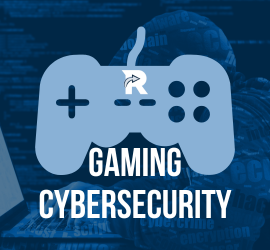
Online gaming leads to a multitude of cyber risks as technology becomes more embedded in how we communicate with each other. Attacks against gamers are on the rise, according to Kapersky.
“The popularity of online gaming surged during the COVID-19 pandemic—and so did cyberattacks against gamers with 5.8 million attacks detected over the past year. With a much-anticipated line-up of games rolling out this year like Total War: Warhammer 3 and Elden Ring, the captivated gaming audience remains a prime target for attackers. Summer is another bonus for scammers, as younger gamers spend more time online (often unaware of the risks).” (CPO Magazine).
It's important to remain vigilant in protecting your online gaming accounts. Here are some tips for gaming cyber security.
Passwords:
When gaming it is extremely important to use strong and unique passwords. Don’t reuse old passwords for new accounts when gaming. “Weak passwords make it easy for hackers to gain unauthorized access to your account and steal your personal information, such as your name, address, and credit card details.” (Spice Works).
MFA:
Multi-Factor Authentication is essential to avoid your accounts becoming compromised. “Hardware tokens are not readily available for console game systems but could be for PC games. These actions make it much harder for hackers to gain unauthorized access to your account, steal personal information or commit financial fraud.” (Spice Works).
Beware of Online Friends:
Be cautious when talking to people online. Not everyone is there to play games. “By being mindful of what information you share online, you can reduce the risk of cyber threats and ensure that your gaming accounts and systems remain secure. Protect yourself and your privacy by keeping personal information private and only share necessary details for gameplay.” (Spice Works).
Secure Networks:
Play on secure networks and avoid public Wi-Fi. “Avoid playing games on public or unsecured Wi-Fi networks, as these networks can be vulnerable to attacks. Instead, play on a secure home network. Playing games on public or unsecured Wi-Fi networks can pose significant security risks to your gaming accounts and systems.” (Spice Works).
Update Software:
Always keep your software up to date. Don’t ignore those notifications. “To stay current, it is essential to regularly check for software updates and install them as soon as they become available, including updates for the gaming platform itself and any other software used in conjunction with it, such as web browsers or antivirus software. It is also essential to enable automatic updates to ensure your software is always up-to-date.” (Spice Works).
Moniter Connected Accounts:
If your bank account is connected to any gaming software, be aware that if your account is hacked, unauthorized charges could be made. “In today’s society, monitoring Opens a new window your bank and credit card activity for unusual charges and activity is a good idea. If a cybercriminal gains access to your account, they can start charging it by purchasing in-game items, money and other financial items.” (Spice Works).
Want to learn more about improving cyber security? Responsive Technology Partners is the leading cyber-security expert in the Athens, Metter, Milledgeville, Vidalia, and Atlanta, Georgia areas. We also have locations in Tampa, Florida, Roanoke, Virginia, and Raleigh, North Carolina. Service offerings include I.T. support, cyber-security and compliance, cloud-based POS systems and support, telephony, cloud services, cabling, access control, and camera systems. Our company’s mission is to provide world-class customer service through industry leading I.T. solutions that make every customer feel as if they are our only customer. Please visit our website to learn more: https://www.responsivetechnologypartners.com/.
Sources:
CPO Magazine. https://www.cpomagazine.com/cyber-security/cyber-threats-to-gamers-are-on-the-rise/
Spice Works. https://www.spiceworks.com/it-security/cyber-risk-management/guest-article/gaming-security-tips-parents/




